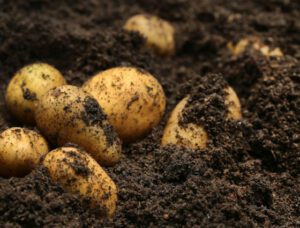It’s widely known among the industry that potatoes need high levels of Ca to achieve maximum yield and quality. However, the nutrient is often considered the most important but limiting macronutrient that affects potato production. Which is interesting when considering that calcium application has only become a common practice over the past few years. Because the practice is still fairly new, the industry is still inefficiently utilizing potatoes’ ability to uptake Ca.
Calcium-Limiting Factors
Potato calcium uptake is directly affected by potassium and cations in the soil, boron (B) deficiencies, soil biology and the type of applied Ca sources:
a) Potato programs have pushed potassium (K) applications to the max, trying to improve size and tubering. However, this directly reduces Ca uptake by creating an antagonistic effect. Due to this reaction, it’s crucial to understand these interactions and manage both nutrients from a systems approach in order to improve both K and Ca plant uptake.
b) B is essential for calcium plant uptake. Growers must make sure that B is present and available in order to stimulate Ca plant uptake.
c) Ca uptake is driven by biology, and the uptake level is determined by soil microbiology activity. Improved soil health and soil microbiology will improve Ca movement from the soil into the crop.
d) A study by Hancock Potato Research Center at the University of Wisconsin showed that Ca sources directly affect plant uptake. The study proved that TerraNu® Calcium improves Ca uptake and crop performance when compared to Gypsum, pelletized Gypsum and liquid Ca sources when applied at the same rates. Within the industry, gypsum is commonly applied in the fall and/or calcium nitrate is applied through a foliar or sidedress application. However, multiple studies throughout the years have proven that these are highly inefficient applications for potato Ca nutrition and nutrient uptake.
Improving Soil Health in Potato Production
Soil health and potato production don’t always align cohesively, and that’s likely because common practices in potato production don’t go hand-in-hand with soil health (no-till, strip-till, etc.) approaches that are better known. Most soils that potatoes are grown in are low CEC, low organic matter and sandy. By understanding that these conditions among the potato industry differ from other crop industries, the industry can support potato growers to take an alternative approach to soil health management.
The number one goal for soil health in potato production should be reactivating the soils. This doesn’t mean improving organic matter, but instead feeding native soil biology with rapidly available carbon sources. Reactivated soils will result in higher nutrient uptake and increased nutrient use efficiency. The easiest way to comprehend this approach is to compare new potato ground vs. old potato ground. By implementing the same fertility program and chemistry levels on each field, the readily available organic matter will show results that speak for themselves. However, the same thing can be said for those fields that show low NPK and chemistry levels yet somehow always show a positive yield. By feeding soil biology and improving soil health, potatoes will show an increased nutrient uptake, ROI and crop performance. Just remember that an active soil is established when macroorganisms (earthworms) and microorganisms (bacteria-actinomycetes and fungi-mycorrhizae) work in your favor by improving nutrient cycling.
TerraNu® calcium provides potatoes with a high quality Ca source while paired with a carbon matrix that stimulates soil biology, increasing plant uptake of Ca, K, B, and S. Each homogenized TerraNu® granule addresses all limiting factors previously addressed while also improving soil health and potato yield and quality.
Learn more about the results from the TerraNu® 2018 Research Trials now.

